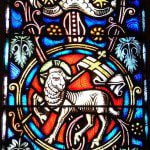
The scholars now reigned supreme within Palestinian Judaism. Family, social standing, and wealth no longer mattered. All that mattered was learning. Study, the scholars said, was even more important than keeping the commandments.[1] They did not claim revelation themselves, and they did not recognize revelation to others. This is well illustrated by the excommunication of Rabbi Eliezer ben Hyrcanus, a conservative scholar who followed the earlier Rabbi Shammai and who, it seems, was something of an individualist. When the Sanhedrin ruled against him on a point relating to ritual purity, he nonetheless insisted that his interpretation was correct. He said he had received a revelation to this effect. So what? said the scholars. The Torah is “not in heaven,” they said, but has been given to man on earth and is to be interpreted by men. At the very time of Rabbi Eliezer’s excommunication, the leader of the Sanhedrin, the great rabbi Gamaliel, was on a ship at sea.[2] A terrible storm arose, and Rabbi Gamaliel feared that he was about to be drowned. Realizing that he was being punished by God for the injury that he and his associates had inflicted upon Rabbi Eliezer, he still refused to back down. Jewish tradition represents him standing on the ship and arguing with the Almighty, contending that the treatment meted out to Rabbi Eliezer had not been done in his own self-interest, but “only for Thine honour, that there shall not be divisions in Israel.”[3]
But even if, from the perspective of the restored Gospel, this fixation on the interpretation of past revelations seems to have blinded Jewish leaders to the possibility of ongoing communication with heaven, it nonetheless served a useful function. The Law, in fact, was the Jews’ earthly salvation. It was the Law that allowed them to survive, unlike many other ancient nations whose names are today known only to scholars. Intense concentration on the Torah helped them to maintain their separateness during their dispersion to the four quarters of the earth. Still, such intense concentration on one thing also noticeably narrowed their intellectual horizon. Where Jews had once produced psalms, allegories, apocalyptic books, and a rich literature of proverbs and wisdom, from this point on, under the dominion of the rabbis and the Torah, they would limit themselves for centuries to writing commentaries and supercommentaries on the Law. The ancient people that had, in a sense, invented the writing of history, now turned their back on such things, perhaps feeling that history had turned its back on them. As a result, it’s difficult to piece together the events of the early centuries after the two disastrous revolts, for there is virtually no Jewish historical and biographical writing from the period.
An example will serve to make the new situation clear: At roughly the time of Christ, a great Jewish thinker by the name of Philo Judaeus lived in Egyptian Alexandria. Philo was thoroughly at home in Greek literature and wrote excellent Greek himself. His attempts to harmonize Judaism with Platonic philosophy put him in the vanguard of the intellectual life of his day. (He is, in my opinion, a highly important figure for the understanding of the Great Apostasy, for he seems to have been the first to apply the tool of allegorical interpretation to the scriptures in order to ensure that they taught philosophy and that they never ever taught anything embarrassing, such as the doctrine of an embodied God.) By the middle of the second century A.D., however, a figure such as Philo would have been unthinkable within Judaism. And, indeed, it’s very striking that, while early Christian thinkers like Origen and Clement of Alexandria carried on the kind of allegorical reconciliation of scripture with Greek philosophy that had been Philo’s chief interest, he had no successors at all within Judaism itself. In fact, Judaism appears to a large extent to lack much of anything that can strictly be called “theology.” The Christians worked up doctrines like that of the “Trinity,” which proved fertile ground for heresies and disagreements, and what Paul Johnson calls “the professional Christian intelligentsia” became preoccupied with disputes over theology and dogma and have remained so down to the present day. The leading thinkers of Judaism, by contrast, were preoccupied with behavior, with the way life should be lived in this world. As Johnson puts it, “Judaism is not so much about doctrine—that is taken for granted—as behaviour; the code matters more than the creed.”[4] Indeed, although Christian theologians began producing creeds from quite an early period, the first Jewish creed was not composed until the Egyptian Jew Saadya Gaon, under influence from Greek philosophy, issued his ten articles of faith in the tenth century A.D. Jewish doctrine was relatively simple—God was one, for instance, not three-in-one-and-one-in-three—and didn’t call forth the kinds of disagreements that would divide Christendom into innumerable warring factions.
[1] Shmuel Safrai, in Ben-Sasson, A History of the Jewish People, 327.
[2] He is not to be confused with the Gamaliel of Acts 5:34-40, who had been dead for many years.
[3] Cited by Shmuel Safrai, in Ben-Sasson, A History of the Jewish People, 324.
[4] P. Johnson, History of the Jews, 161, 162.
Posted from Park City, Utah












